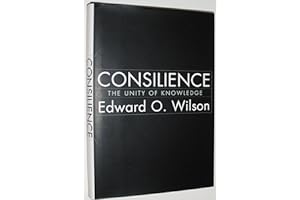One Sentence Summary:
Consilience is a thought-provoking book that explores the interconnectedness of various fields of knowledge and how they can be integrated to provide a more comprehensive understanding of the world.
Book Genre:
Non-fiction
Main Topic of the Book:
The main topic of the book is the concept of consilience, which refers to the unity of knowledge across different disciplines and the potential it holds for developing a more complete understanding of the world.
Key Ideas:
– The need for a unification of knowledge across different fields to overcome the current fragmentation of knowledge
– The importance of the scientific method in understanding the natural world and human behavior
– The role of reductionism in breaking down complex systems into smaller, more manageable parts
– The potential for interdisciplinary collaboration to solve complex problems and advance human understanding
– The impact of culture, biology, and genetics on human behavior
– The ethical implications of scientific advancements and the importance of responsible use of this knowledge
Main Parts of the Book:
Part I: The Convergence of Knowledge
The first part of the book introduces the concept of consilience and argues for the need to integrate knowledge from various fields, such as biology, psychology, economics, and sociology.
Part II: Three Roads to Unity
In this section, the author explores three approaches or “roads” to achieving consilience: reductionism, systems theory, and complexity theory.
Part III: The Unity of Knowledge
The third part of the book delves deeper into the concept of consilience and how it can be applied to various fields of study, including the natural sciences, social sciences, and humanities.
Part IV: The Unfinished Synthesis
In the final section, the author discusses the challenges and barriers to achieving consilience, as well as the potential impact it could have on society and human progress.
Key Takeaways:
– Knowledge should not be limited to one discipline, but rather integrated across various fields to provide a more holistic understanding of the world.
– The scientific method is a reliable tool for understanding the natural world and human behavior.
– Interdisciplinary collaboration is essential for solving complex problems and advancing human knowledge.
– Consilience has the potential to bridge the gap between the sciences, social sciences, and humanities.
– Responsible use of scientific advancements is necessary to prevent potential negative consequences.
Author’s Background and Qualifications:
Edward O. Wilson is an American biologist, researcher, and writer. He is known for his groundbreaking work on the sociobiology of ants and other animal species. Wilson is also a two-time Pulitzer Prize winner for his books “On Human Nature” and “The Ants”. He is a professor emeritus at Harvard University and has received numerous awards and honors for his contributions to the field of entomology and conservation.
Target Audience:
This book is targeted towards academics, scientists, and intellectually curious readers who are interested in understanding the interconnectedness of knowledge and the potential it holds for shaping our understanding of the world.
Publisher and First Publication Date:
Consilience: The Unity of Knowledge was first published by Alfred A. Knopf Inc. in 1998. It has been rereleased in various editions since then, including a revised and updated version in 2017.

